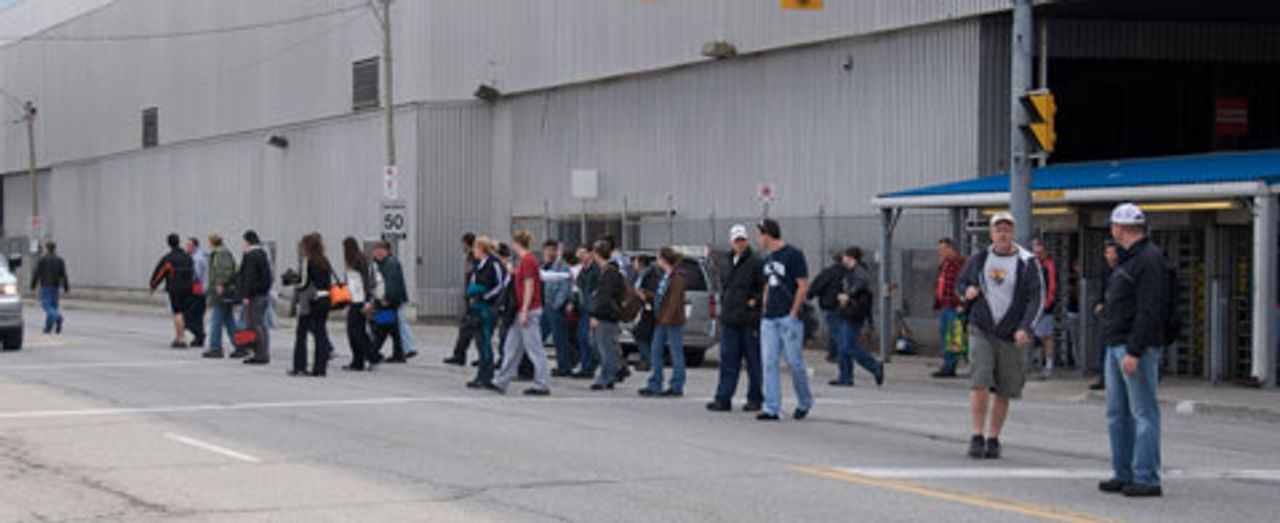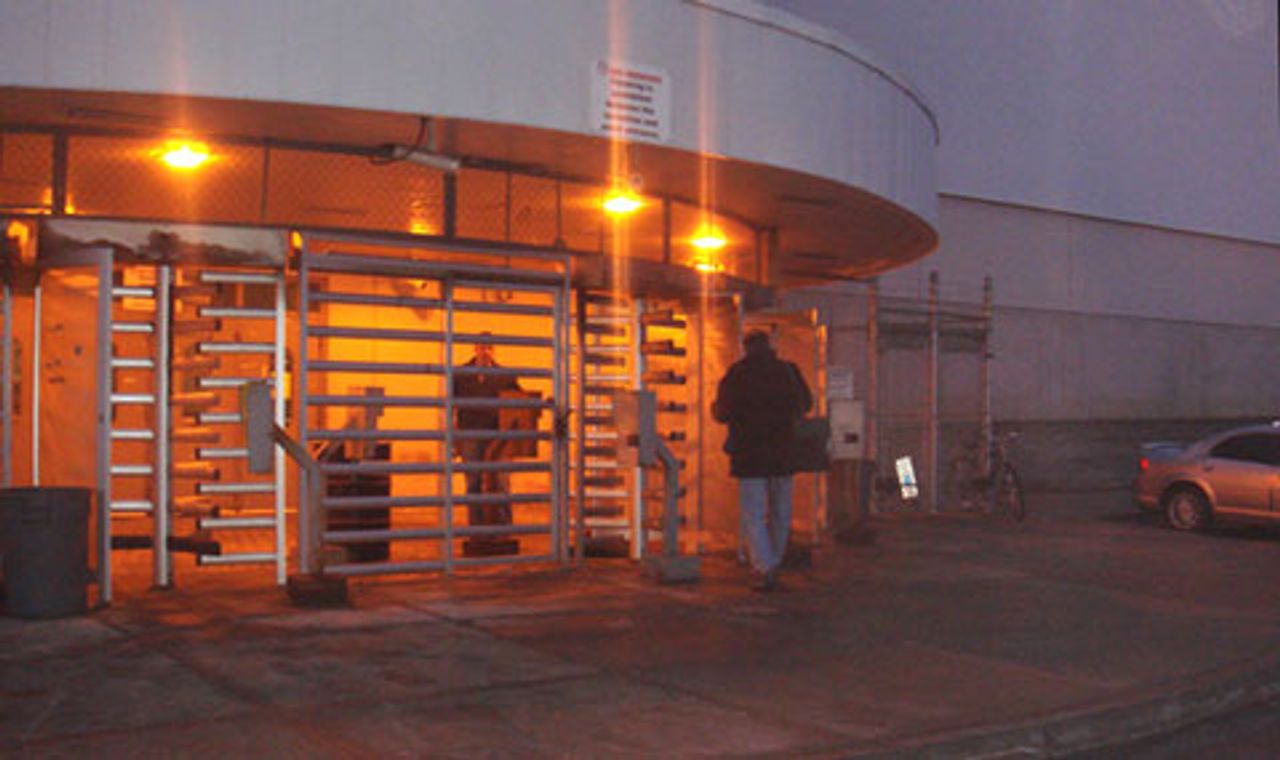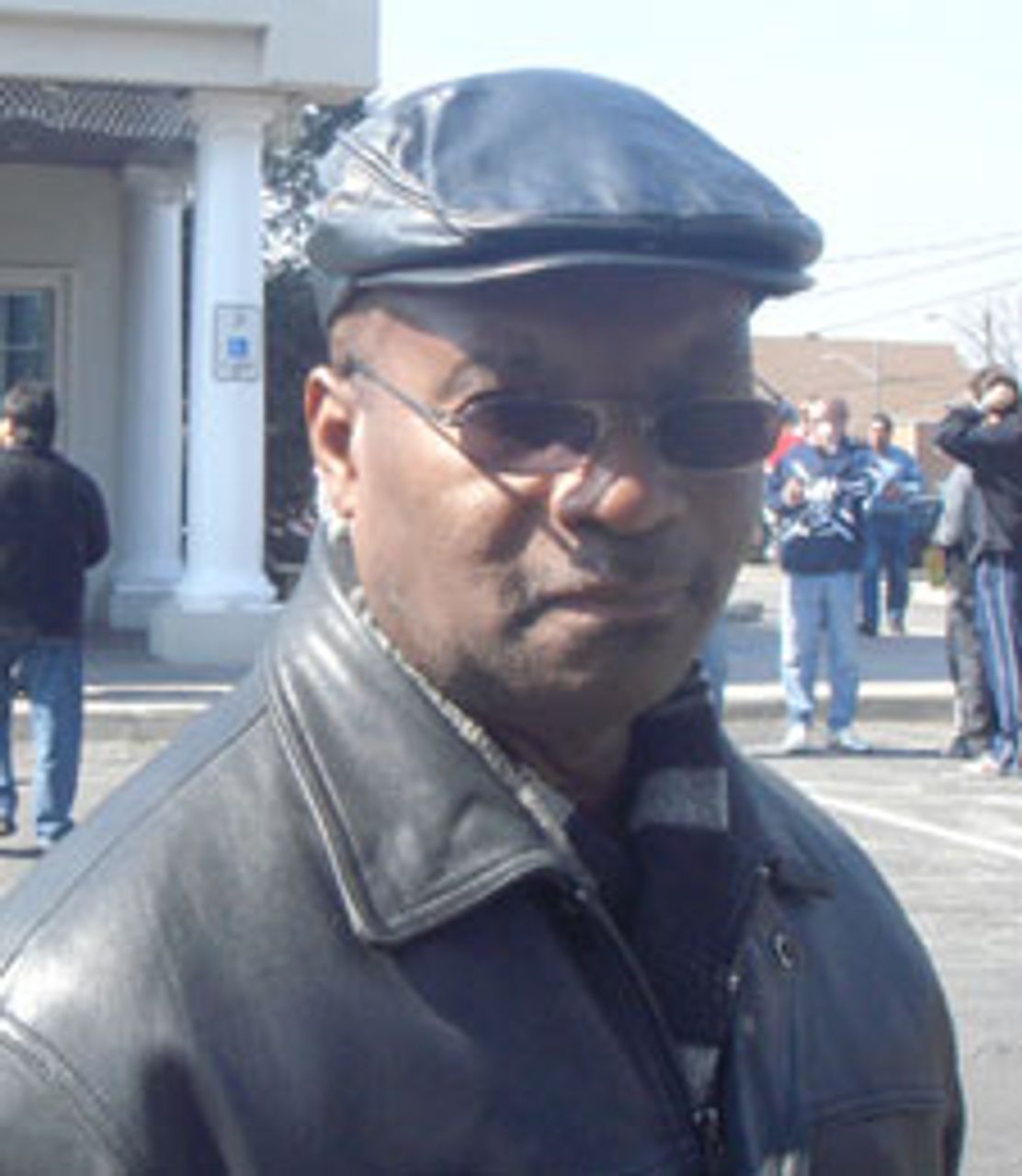 Workers leaving the Chrysler minivan plant in Windsor at end of shift
Workers leaving the Chrysler minivan plant in Windsor at end of shiftWorld Socialist Web Site reporting teams intervened at all three of Chrysler Canada's manufacturing facilities in southern Ontario this weekend, as talks between the Canadian Auto Workers union (CAW) and the company reached an impasse over the size of the concessions package that the two sides are negotiating.
On Friday, WSWS teams distributed a statement, "Reject CAW sellout at Chrysler! Mobilize autoworkers across North America to defend all jobs and oppose concessions!" to hundreds of workers at the Windsor minivan plant, the Brampton Assembly plant, and the Etobicoke Casting facility in west Toronto. A WSWS team also campaigned amongst two hundred Etobicoke workers attending their local union information meeting Saturday morning.
Even as the teams were intervening with a socialist program to defend jobs, wages and living conditions at the Friday shift changes, CAW president Ken Lewenza appeared live on local and cable news broadcasts from the union's plush suites at the Toronto Sheraton Centre to bitterly denounce the negotiating tactics of the Chrysler brain trust.
"I'm disappointed," said Lewenza, "because every time, and two times for sure, we thought we had an agreement in place, an understanding in place, the goal posts shifted."
Lewenza then went on to speculate that the reason for the "shifting goal posts" was the behind the scenes machinations of forces not, at least physically present, at the bargaining table. "What's happening in the United States with the Treasury Board and the auto task force that reports directly to Obama is complicating the process," Lewenza said. "We're dealing with Chrysler, we're dealing with Daimler, we're dealing with Fiat, we're dealing with private equity (Cerberus), we're dealing with bankers."
The talks in Canada come as US President Barack Obama prepares to announce his administration's plan for the auto industry in Washington on Monday. The Obama administration is likely to demand deeper concessions from Chrysler and General Motors Corp. (GM) in exchange for additional federal loans. Both automakers have received a total of $17.4-billion (US) in US government loans. GM is seeking another $16.6-billion, while Chrysler wants $5-billion more.
In Canada, GM is seeking an estimated $6-billion (US) in loans from Ottawa and the Ontario government to stabilize its drastically shrinking Canadian operations. Chrysler is requesting $2.25-billion (US). Both companies were required to cut labour costs in order to be considered for government aid. Due to the impasse at Chrysler, a March 31st deadline imposed by the US and Canadian governments for "stakeholders" to agree on a "viable" restructuring package may now not be met. Indeed, there are powerful factions within the ruling elite who are pushing for the outright bankruptcy of one or both the automakers, and the concomitant shredding of labour contracts, as the going price for bailout dollars.
Already, Chrysler President Tom LaSorda, son of former CAW Local 444 president Frank LaSorda, has threatened to axe all 9,400 Chrysler worker jobs in Canada unless the CAW negotiating team is prepared to grant Chrysler significantly more concessions than the CAW surrendered to GM in a deal ratified last month. That agreement saw the CAW concede over $7 per hour in benefit costs, plus work-rule givebacks that will further intensify speedup pressures on the shop floor. The CAW leadership has refused to place any specific dollar value on the concessions package. But CAW economist Jim Stanford told the Toronto Star the givebacks exceed the $400 million in concessions the union gave GM only last year when the union secretly re-opened contracts early with the Detroit Three automakers.
In a statement put out to counter Lewenza, Chrysler chief negotiator Al Iacobelli said the company needs to reduce total labour costs by $19 per hour. "Although we made progress toward closing the gap, significant issues related to the existing pattern remain on the table. These are not normal business circumstances and all Chrysler constituents have been asked to ‘break pattern'—employees, retirees, dealers, suppliers and others." Chrysler is demanding that the CAW cut per worker hourly labour costs from the current $76 an hour to $57 an hour, which is what it claims Toyota Motor Manufacturing Canada pays its auto assemblers.
Among the new demands from Chrysler, over and above those concessions already surrendered to GM, are the elimination of a week of paid time-off time at Canadian plants to match the five weeks at Chrysler's US plants; increasing Canadian retirees' cost-sharing for health care to the UAW level, which is three times what CAW members pay; ending tuition reimbursement for CAW members, because it is no longer available to UAW employees and salaried workers in Canada and the United States; and reducing break times at the Brampton and Windsor plants from 53 minutes and 56 minutes a day, respectively, to match the 40 minutes at GM's Oshawa, Ontario plants.
LaSorda and Iacobelli have also targeted $80-million in health care commitments that Chrysler faces when it pays above provincial health care rates for retirees who live in Florida during the winter months and employees who go on vacation or seek medical care outside Ontario.
Despite bluster about the absolute necessity of duplicating the "pattern" of concessions given to GM—a bluster meant primarily for the ears of an increasingly restive membership, Lewenza has already made it be known that he is willing to negotiate further give-backs. A statement posted on the CAW's website Friday stated, "Talks with Chrysler have broken down after the company turned down both the pattern agreement established with General Motors as well as other cost-savings specific to Chrysler." [emphasis added]
Workers who spoke to the WSWS reporting teams over the weekend expressed a deep concern about the future of their livelihoods and the ability of the CAW to defend their interests. Al, a veteran line worker at the Brampton plant stopped on his way in to the morning shift to take the Socialist Equality Party (Canada) statement. After reading the headline, he asked for several more to take inside for his workmates.
"The union's been selling us out for years", he said. "Look at what happened last year. They came at us for special concessions—local, they called them—and said they'd close a shift, maybe the whole plant, unless we knuckled under. We voted ‘hell, no' so they sent in Chernicki, the top union guy, and he basically told us to keep voting until we got it ‘right.' So in the second vote they pushed it through. When you see your own reps siding with the company, well you pretty much figure you're not going to win the fight."
 A gate at Chrysler's Brampton Assembly plant
A gate at Chrysler's Brampton Assembly plantAnother worker at the Brampton plant initially refused to take a leaflet, wrongly assuming that the WSWS team was distributing official CAW material. But when told that the SEP opposes the union bureaucracy, he stopped to listen. When told about a recent plant occupation by Windsor auto-parts workers that was scuttled by CAW officials, he mentioned the recent occupation by auto-parts workers at the SKD Brampton feeder plant for GM: "The same thing happened here. The guys get thrown out with barely a penny and the union talks them out of the action by offering them a few extra peanuts. I'm disgusted with the whole thing. I don't know what the hell to do".
It was not unusual for workers to take more than one leaflet. Earlier that morning at the Etobicoke Casting plant, another veteran worker offered to take leaflets into the plant for his entire crew. The Casting plant is slated to close in 2011 unless the facility is purchased by another operation, which is highly unlikely in the current climate. "All the guys are on layoff right now. Lately, there's more downtime than uptime. But I'm working inside with a dozen guys. Give me a dozen of your leaflets."
 Steve, a worker at Chrysler's Toronto
Steve, a worker at Chrysler's Torontocasting plant
The WSWS team met more Casting plant workers at their local information meeting Saturday morning. Ken Lewenza addressed the meeting. Steve, a worker who reflected more conservative views stated, "These are hard times—we realize that and we're prepared to work with the company. After all is said and done I think the deal that we did with GM should stand. It's a pattern and we're accustomed to pattern bargaining for the last 25 years in the CAW and I don't think we should break that. We gave up a lot. and the public doesn't know. We have to educate the public. The media seem to portray us as fat cats who make $75.00 an hour, which is so wrong. I think what we have done with the GM deal is it. We can't give up any more."
Another worker, when asked what he thought would be the rank-and-file reaction if the concessionary "pattern" established at GM was junked for deeper cuts at Chrysler, said, "It's not going to be pretty, that much I can tell you".
At the Friday afternoon shift change at Windsor's minivan assembly plant, workers were in a combative mood.
 Eddie
EddieEddie told the WSWS that he was angered that Chrysler was demanding workers renegotiate their contracts. "I would not give up anything," he said in reference to the concession demands the CAW is poised to make on its membership. "We can't give up anything more. You can't squeeze blood out of a rock."
The WSWS also spoke with Jim Lee, a worker with 14 years experience. Jim expressed anger over the unfairness of the new round of concessions and layoffs. "The executives got their bonuses, but now they're asking us to take pay cuts," he said. "The rich are attacking everything that built a middle class in Canada and America."
 Jim Lee (right) and a fellow worker from the Windsor plant
Jim Lee (right) and a fellow worker from the Windsor plantJim expressed anger toward the Canadian Auto Workers union. "They're telling us we have to take pay cuts to be competitive with American workers. That'll never work," he said. "They're selling us a company argument."
In addition to distributing the Socialist Equality Party (Canada) statement, the members of the WSWS team invited workers to attend a regional conference in Ann Arbor, Michigan, of the Socialist Equality Party, "The World Economic Crisis, the Failure of Capitalism, and the Case for Socialism."
A number of workers expressed anger toward the Canadian government. "We need a revolution!" a couple of workers entering their shift yelled. Another said, "We need to burn parliament!"
In discussions with workers at all three Chrysler facilities, SEP Canada members campaigned for Chrysler workers to reject the concessions contract that Chrysler, the big business federal and Ontario governments, and the CAW bureaucracy are conspiring to impose on them and revive the militant traditions that have been suppressed by the trade union bureaucracy.
They should prepare to occupy the plants, so as to counter Chrysler's threat to pull out of Canada, and urge all workers at GM and Ford in Canada and the US, as well as workers in the auto-parts industry and non-union transplants, to join them in a North America-wide strike.
The SEP Canada statement declared:
"A decisive end must be put to the attempts of the Detroit Three and the unions to pit worker against worker by waging an international struggle in defense of all workers' jobs and in opposition to all concessions.
"Seventy years ago autoworkers in Canada and the US joined forces to found the UAW because they recognized that to fight the giant auto companies they needed to unify their struggles across the Canada-US border. Today in the area of integrated global production—where the transnational corporations systematically seek to pit workers against each other, placing production wherever the greatest profits can be wrung from the workers—autoworkers cannot take a step forward unless they consciously organize themselves as an international force.
"Such a struggle will only be mounted independently of, and in opposition to, the CAW bureaucracy, through the establishment of committees of rank-and-file workers in the factories and of working people, youth and the unemployed in the communities.
"Militant industrial action must be linked to an entirely new political strategy and perspective.
The crisis in the auto industry is part and parcel of the failure of capitalism in North America and around the world. The only alternative that represents the interests of the working class is the fight for socialism.
"To advance their own solution to the crisis, workers need to be organized as an independent political force, in a mass workers' party, in opposition to the various mouthpieces for big business in the Conservative, Liberal and New Democratic parties.
"With the bringing to power of a workers' government, the auto industry can be taken out of the hands of the corporate executives and financial speculators who have driven it into the ground, and transformed into a public utility, democratically owned and controlled by the working people themselves. Then production and employment can be organized in the interests of all, rather than the profits of a few and the auto industry retooled to build safe, affordable transportation, in cooperation with autoworkers around the world."
